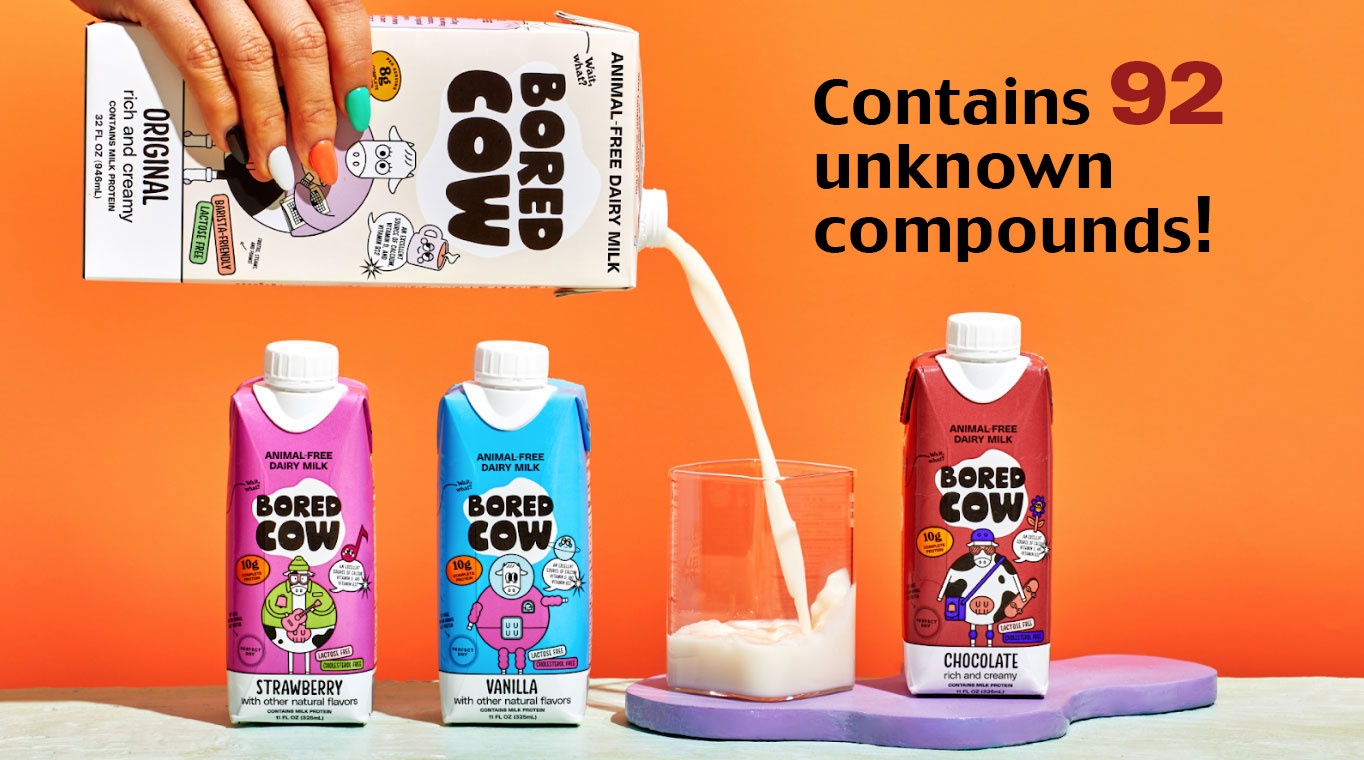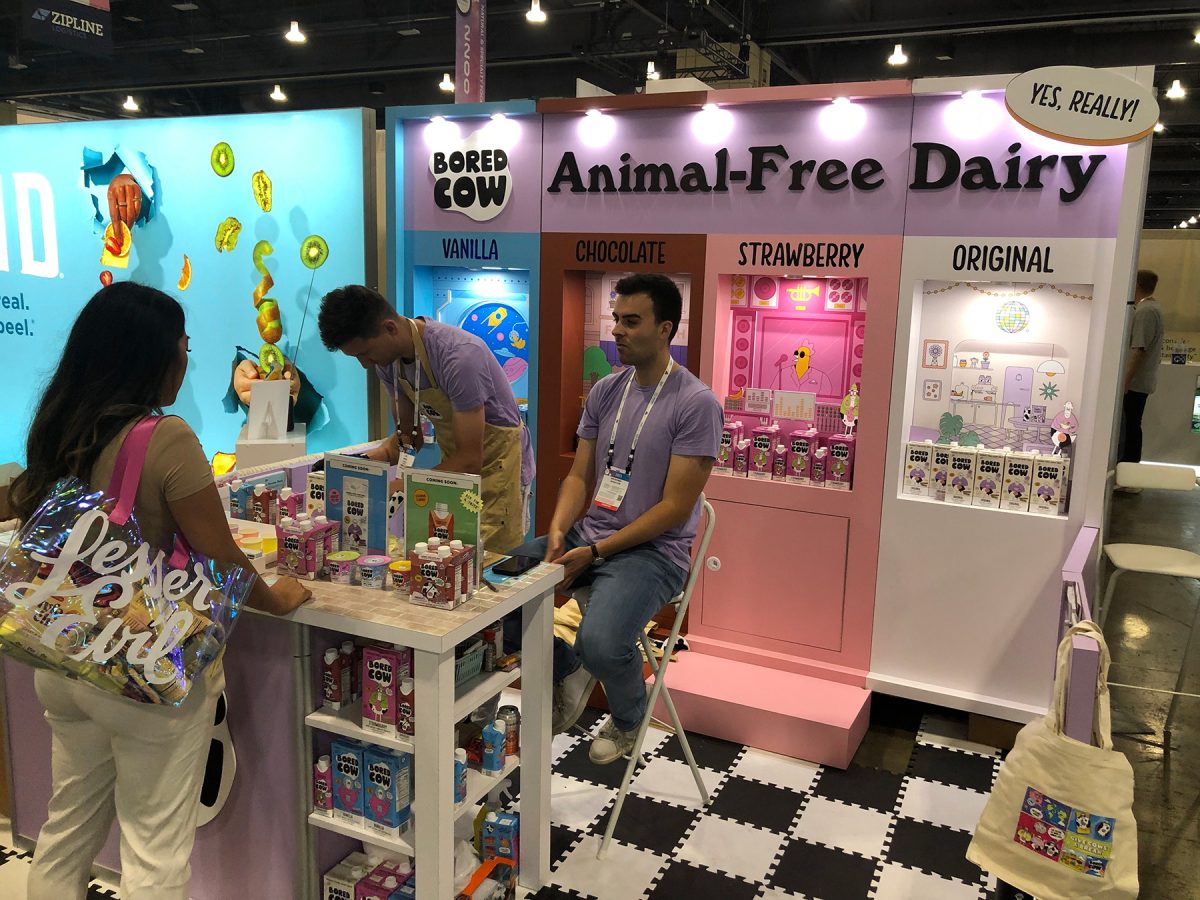Not so precise fermentation: Lab finds 92 unknown compounds in synthetic biology milk

Testing reveals unknown molecules and fungicide in Bored Cow dairy alternative; findings dispute claims that synthetic biology-produced dairy protein is identical to real dairy protein.
A laboratory recently discovered 92 unknown compounds in an alternative dairy product produced using a “precision fermentation” process that involves the use of genetic engineering.
Molecules unknown to science
Iowa-based Health Research Institute (HRI) tested a Bored Cow product, which is described as “a milk alternative made with milk protein from fermentation instead of cows.” Using full spectrum molecular analysis technology, HRI found 92 small molecules in the product that are unknown to science, according to John Fagan, chief science officer at HRI.
“They’re completely novel to our food,” he says. “They are things that we haven’t consumed as human beings.”
Fagan scanned scientific literature and databases to determine whether the molecules had nutritional or other beneficial properties and found nothing.
“I couldn’t even find the scientific name for the vast majority of the molecules present in the Bored Cow product. They are nutritional dark matter,” Fagan says.
The unknown molecules could be nutrients or waste products generated during the fermentation process. Of the latter, Fagan says: “You don’t necessarily want them in your food.”
By contrast, the compounds in cow’s milk like vitamins, minerals, sugars, and carbohydrates are well known to be safe and nutritious, Fagan says.
HRI’s testing also found residues of a fungicide at a substantial level. Fagan thinks it may have been added to the fermentation process to prevent the growth of microorganisms during the production of the diary protein. But the fungicide carried over into the Bored Cow milk. Fungicides are used in agriculture to kill fungi. HRI tests foods for pesticide residues.
Bored Cow did not respond to an email asking for their reaction to HRI’s findings.
GMO “microflora”
Bored Cow milk alternative is made with an animal-free whey dairy protein from Perfect Day, which uses a synthetic biology process called “precision fermentation” to make the protein. This involves taking a gene for whey protein and putting it into a genetically engineered yeast. Bored Cow and Perfect Day use the term “microflora” to avoid using “genetically engineered” or “GMO.” The GMO yeast is then put into stainless steel fermentation tanks with sugar or high fructose corn syrup, water, and nutrients. The additional ingredients help the yeast grow and produce the protein. The GMO yeast is then filtered out, leaving the milk protein, which is purified and dried. Bored Cow then takes the milk protein, and adds vitamins, minerals, sugar, and other ingredients to give it the flavor and consistency of real milk.
Perfect Day’s whey dairy protein, which is called ProFerm™, is used by a growing number of other food and ingredient companies, including Nestlé, Bel Group, Myprotein, Renewal Mill, and JuiceLand. Those companies use the protein to make dairy-free milk, chocolate, cream cheese, ice cream, and upcycled baking mixes.
Bored Cow milk is “strikingly different” from real milk
According to Fagan, the 92 unknown molecules “came along for the ride” with Perfect Day’s milk protein in the Bored Cow product.
Perfect Day and Bored Cow both claim the milk protein is identical to the protein in cow’s milk but HRI’s tests found that the protein in Bored Cow’s milk was mostly from the GMO yeast and not the milk protein.
“The amino acid composition of the protein that’s present in the Bored Cow milk is strikingly different from the amino acid composition of real milk,” Fagan says. “We have data that shows this is the case.”
While Perfect Day says on its website that precision fermentation is a “decades old process,” Fagan says the term is a misnomer.
“The term ‘precision fermentation’ is not accurate,” he says. “Our research shows that it is far from precise.”

Bored Cow promoted their synbio milk at Natural Products Expo East in September.
GMO DNA not removed
Both Perfect Day and Bored Cow claim their synbio products aren’t GMOs because the GMO-derived “microflora” or yeast is removed during the fermentation process. Fagan calls that “wishful thinking.”
“The (genetically engineered) DNA in these products is broken up or fragmented but is certainly still there,” Fagan says.
Further he says tests are being developed to detect the GMO DNA in synthetic biology products like Bored Cow.
“The reality is that all that’s required is to do a little bit of molecular biology and a GMO test can be developed for synbio products,” says Fagan who pioneered creating laboratory tests for GMO corn and soybeans when they were first commercialized in the late 1990s.
The presence of GMO DNA in Bored Cow and other synbio products would mean that they would have to be labeled under the U.S. Department of Agriculture’s National Bioengineered Food Disclosure law. Right now, such products don’t require labeling.
No safety testing
The U.S. Food and Drug Administration doesn’t require safety testing of the Bored Cow product or other synbio food products. But in Europe and Canada, the synbio milk—with its 92 unknown compounds—would be considered a novel food product and need to be safety tested before going on the market.
“These products have gone on the market without the FDA requiring safety assessments of these compounds,” Fagan says. “There needs to be long term safety tests before these products are put on the market.”
Bored Cow’s products are being sold in retail supermarket and natural food chains such as Sprouts Farmers Market. Bored Cow, which is a brand of Tomorrow Farms, also promoted their milk alternative at Natural Products Expo East trade show in Philadelphia last September. The presence of synbio companies like Perfect Day and Bored Cow at Natural Product Expos East and West has been controversial as natural food industry members say the companies have no business exhibiting at a natural food event.
Synbio industry based on flawed assumption
Synbio companies claim their products are more sustainable and climate-friendly. But Errol Schweizer, partner of food and agriculture at Impakt, IQ, asks several important questions about precision fermentation in an article in Forbes: How much waste material will be produced from the synbio process and how will it be disposed of? How does the energy and resource usage of such products compare to competing animal-based items? Also, how can the use of high fructose corn syrup as a feedstock be sustainable when corn production in the U.S. is energy intensive and polluting?
According to Fagan, the synthetic biology industry is being promoted on a flawed assumption. Investors in synbio companies—which are being fueled by billions of dollars in venture capital—are being told that synbio products like Bored Cow are created like software; that it’s just a matter of programming the DNA like a computer. An article in FoodNavigator USA even describes GMO yeasts being “programmed” to produce proteins. The problem is that the internal functioning of even the simplest organisms like a yeast is vastly more complex than computer programs.
“It is a hollow analogy because it implies that you have the same kind of precise control in synthetic biology that you have programming a computer. It’s much more complex,” Fagan says. “Here we have an example of 92 unpredicted compounds being produced, and only a trace of the whey protein that you really want. It’s nothing like precision.”
Organic & Non-GMO Insights December 2023




